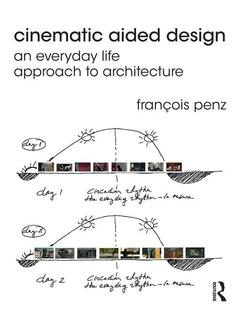Description
Cinematic Aided Design
An Everyday Life Approach to Architecture
Author: Penz François
Language: English
Subject for Cinematic Aided Design:
Keywords
Mon Oncle; spatial cinema; Dog Leg Stairs; architecture and film; Nicolas Winding Refn; digital architecture; Babette Mangolte; digital media; Die Neue Wohnung; design representation; Le Corbusier’s Villa Savoye; experimental cinema; Jim Jarmusch; film and the city; Jacques Tati; cinematic urbanism; Everyday Life Approach; visualising the city; Sidney Hayers; Le Corbusier; Post-occupancy Studies; Jean Pierre Jeunet; Young Man; Lemmy Caution; Deeper Spaces; Oneiric House; Vice Versa; Pierre Chenal; Villa Savoye; Stairs Scene; Lefebvre’s Writing; Everyday Architecture; Cinematic Intelligence; Town Halls
Publication date: 08-2017
· 18.9x24.6 cm · Paperback
Publication date: 08-2017
· 18.9x24.6 cm · Hardback
Description
/li>Contents
/li>Readership
/li>Biography
/li>
Cinematic Aided Design: An Everyday Life Approach to Architecture provides architects, planners, designer practitioners, politicians and decision makers with a new awareness of the practice of everyday life through the medium of film. This novel approach will also appeal to film scholars and film practitioners with an interest in spatial and architectural issues, as well as researchers from cultural studies in the field of everyday life.
The everyday life is one of the hardest things to uncover since by its very nature it remains overlooked and ignored. However, cinema has over the last 120 years represented, interpreted and portrayed hundreds of thousands of everyday life situations taking place in a wide range of dwellings, streets and cities. Film constitutes the most comprehensive lived in building data in existence. Cinema created a comprehensive encyclopedia of architectural spaces and building elements. It has exposed large fragments of our everyday life and everyday environment that this book is aiming to reveal and restitute.
Introduction 1. The Case for Everydayness Part 1: Everydayness and Cinema 2. Introduction to Everydayness and Cinema 3. The Value of Fiction and the Role of Disruptions 4. Georges Perec & Chantal Akerman 5. Rhythmanalysis 6. Cinematic Typologies of the Everyday Part 2: An Architectonic of Cinema 7. Introduction 8. Windows 9. Doors 10. Stairs 11. Joining the Dots Part 3: Cinematic Aided Design 12. Towards a Cinematic Approach to Everyday Life and Architecture
Professor François Penz is the Head of the Department of Architecture at the University of Cambridge, a former Director of The Martin Centre for Architectural and Urban Studies and a Fellow of Darwin College. He directs the Digital Studio for Research in Design, Visualization and Communication. His current AHRC research project, ‘A cinematic musée imaginaire of spatial cultural differences’ (2017-2020), expands many of the ideas developed in this book to other cultures (China and Japan in particular), construing films of everyday life as a revelator of deep spatial cultural differences.




